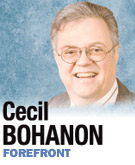Subscriber Benefit
As a subscriber you can listen to articles at work, in the car, or while you work out. Subscribe Now
 The outgoing Daniels administration takes great pride in its fiscal probity and not without justification—the state’s budget is in surplus, its credit rating is better than the U.S. governments’, and business taxes have been reduced.
The outgoing Daniels administration takes great pride in its fiscal probity and not without justification—the state’s budget is in surplus, its credit rating is better than the U.S. governments’, and business taxes have been reduced.
The Tax Foundation is a most venerable fiscally conservative D.C. think tank. Established in 1937 by business executives concerned about fiscal excess, Hoosier businesses will find its ranking of the states’ business tax climate of interest.
One would think Indiana would be in the top five in its business tax climate ranking. Instead, Indiana ranks 11th overall and only 18th in the corporate tax component of the index.
What gives? What would Indiana have to do to move up in the rankings and how would the proposed tax plans of the gubernatorial candidates affect the state’s status?
Going into the weeds of its methodology yields two insights. The index gnomes like almost any tax cut, especially a general tax cut, and they hate targeted tax credits and special tax packages for business. To quote: “…if a state needs to offer such packages, it is most likely covering for a bad business tax climate.”
Its index therefore rewards states that do not offer investment tax credits, job tax credits and R&D tax credits—all of which are part of the Hoosier tax code.
It may seem strange that a pro-business tax watchdog objects so strenuously to business tax credits, but the logic is simple. Any tax cut targeted to a favored sector could be reformulated as a smaller tax cut for all. Targeted tax cuts imply a hubristic government that thinks it can pick the winners or a government captured by special interest or likely both.
So what does perusing the websites of the gubernatorial candidates reveal?
Democrat John Gregg wants to cut the sales tax on gasoline—that’s good with the foundation but not great. (I’ve never understood why this particular tax cut is so near and dear to the heart of Hoosier Democrats. I guess the environmentalist faction of the party was on an organic tea break when this one was hatched.)
It then explicitly extols the virtues of targeted tax breaks—including job tax credit, etc. Oh-oh, that sinks us. Gregg gets a D-. His plan will cause us to fall in the rankings.
Republican Mike Pence calls for a 10-percent across-the-board personal income tax cut—good! Broad-based and prudent, it will play well at the foundation. On the Pence website, there is no explicit discussion of business taxes, no mention of further targeted tax cuts, but no mention of eliminating current ones.
But there is some scary stuff about emphasis on certain industries and sectors. The fear is that in a Pence administration, specially targeted tax cuts will come out of the woodwork. Pence gets a C+. His plan will likely leave our ranking unaffected.
Finally, Libertarian Rupert Boneham’s website simply states, “We must continue to restructure Indiana’s tax system, eliminating political favoritism and cronyism.” The rhetoric is good, but it is short on specifics. It is axiomatic that a Libertarian wants to cut taxes, but which ones, Rupert?
Nevertheless, the Libertarians get high marks for noting that favoritism and cronyism are bad things, even when couched in “economic development” language. A Boneham administration would likely pass major tax cuts and rescind targeted tax breaks. Boneham gets a B. His approach will likely cause Indiana to rise in the rankings.
Of course, getting on Tax Foundation’s good side is not the end all and be all of state policy, even state tax policy. But low, flat, uniform taxes without special provisions are an admirable goal, however counter to political reality.•
• Bohanon is an economics professor at Ball State University. Send comments on this column to [email protected].
Please enable JavaScript to view this content.
